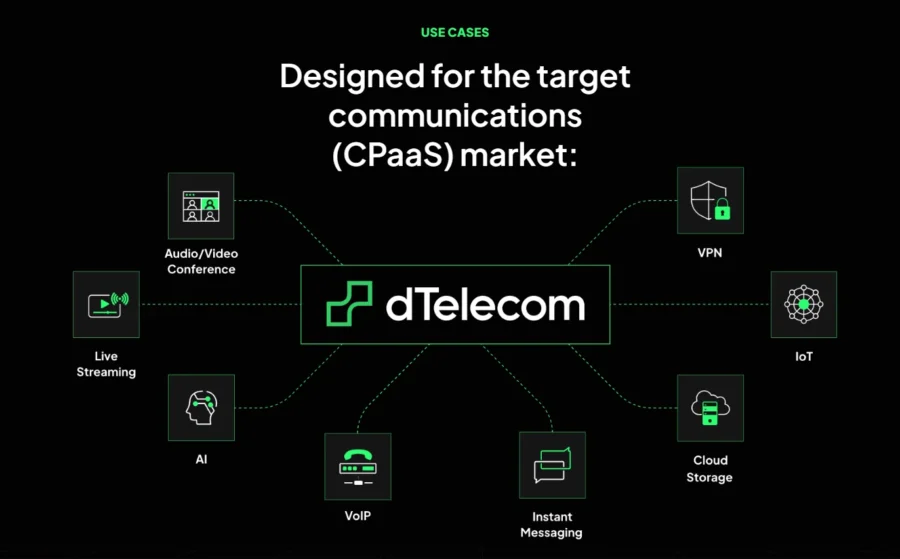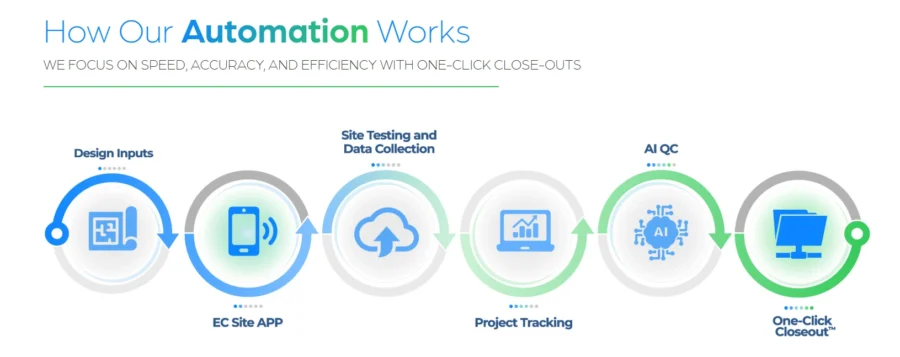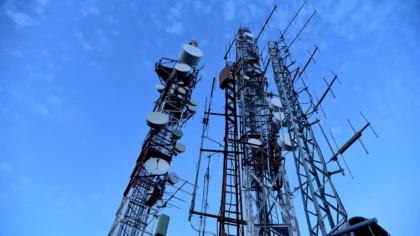As the telecom infrastructure industry evolves, startups are leading the way with innovative solutions to meet the demand for modern connectivity. They utilize decentralized networks, self-powered cell towers, and blockchain-based data security to provide cost-effective and sustainable options. AI-driven automation and modular network software improve performance, reduce latency, and drive the deployment of 5G and beyond. This article highlights 10 top telecom infrastructure companies shaping the future of the industry.
10 Telecom Infrastructure Companies to Watch in 2025
- MinWave – Micro/Millimeter-Wave Systems
- Karrier One – Decentralized Telecom Network
- dTelecom – Blockchain Technology Based Data Security
- Aradatum – Self-powered Macro Cell Towers
- JAG Industrials – Decentralized Wireless (Peer-to-Peer) Infrastructure
- Blindspot Technologies – Automatic Incoming Traffic Cleaning
- CIMware – Composable Infrastructure Module
- ECSite – AI-Enabled, Cloud-Based SAAS Automation Platform
- rBlox – Modular Network Software Solution
- EdgePoint Infrastructure – 5G-ready Telecommunication Tower Infrastructure
Global Startup Heat Map highlights 10 Telecom Infrastructure Startups to Watch
Through the Big Data & Artificial Intelligence (AI)-powered StartUs Insights Discovery Platform, covering over 4 760 120+ startups & scaleups globally, we identified 790+ telecom infrastructure companies.
The Global Startup Heat Map below highlights the 10 telecom infrastructure startups you should watch in 2025 as well as the geo-distribution of all 790+ startups & scaleups we analyzed for this research.

Based on the heat map, we see high startup activity in the USA and Europe, followed by India.
We hand-picked startups to showcase in this report by filtering for their technology, founding year, location, funding, and other metrics.
These 10 telecom infrastructure startups work on solutions advancing micro/millimeter-wave systems, decentralized telecom networks, composable infrastructure modules, self-powered macro cell towers, and more.
Moreover, based on the data from the platform, the Top 5 Telecom Infrastructure Startup Hubs are in London, New York City, Singapore, Warsaw, and Bangalore.
Meet 10 Telecom Infrastructure Companies to Watch in 2025
1. MinWave
- Founding Year: 2021
- Location: Vaud, Switzerland
- Use For: 5G and Satellite Optimization
Switzerland-based startup MinWave utilizes metamaterial techniques for designing compact and lightweight micro/millimeter-wave waveguide devices.

For the fabrication of these components, MinWave uses additive manufacturing to achieve size and weight optimization in the realm of 5G communications. These parameters are crucial considerations in system design in terms of cost where each additional kilogram in a satellite’s design adds a major amount of francs in launch and mission costs.
Additionally, the technology enables the production of low-cost monolithic RF components with intricate geometries. The startup employs surface chemical treatments that effectively reduce insertion loss and increase power handling capabilities.
2. Karrier One
- Founding Year: 2021
- Location: Markham, Canada
- Use For: Global Connectivity, 5G Deployment, Web3 Number Management
Canadian startup Karrier One integrates telecom and web3 for decentralized, high-quality connectivity. Its platform, Karrier One Chain, creates a decentralized network with widespread 5G capabilities which offers connectivity in underserved areas.
Further, the network is governed to prevent undue influence from any single entity while promoting community-driven decisions. Karrier One Mobile offers global connectivity at reduced costs by using carrier-grade infrastructure.
In addition, the Karrier Number System (KNS) simplifies mobile number management for web3 activities which enhances security and convenience. Its plug-and-go radios facilitate easy deployment and connect to remote and urban areas alike.
Moreover, the network’s blockchain-based architecture provides enhanced privacy and security for user data. Karrier One also partnered with the Sui Foundation to integrate advanced telecom services with Web3 technology.
3. dTelecom
- Founding Year: 2022
- Location: Dubai, United Arab Emirates
- Use For: Low-Latency Media Delivery, Secure Audio/Video Applications
dTelecom provides a decentralized communication infrastructure for audio/video conferencing as well as live streaming. This infrastructure uses a decentralized physical infrastructure network (DePIN) to build scalable, fault-tolerant, and cost-effective communication solutions.

Moreover, the platform employs web real-time communication content delivery network(WebRTC CDN) technology to deliver low-latency media streams. This solution allows developers to integrate audio/video functionalities into applications while ensuring open-source transparency.
4. Aradatum
- Founding Year: 2020
- Location: Brighton, USA
- Use For: Off-grid Connectivity
Aradatum advances telecom infrastructure with self-powered macro cell towers to enable deployment in remote and challenging locations. By using renewable wind and solar energy, these towers eliminate the need for grid connections as well as reduce environmental impact.
Moreover, these towers provide solutions for communication, connectivity, and mobility needs by hosting antennas, servers, and equipment. The towers also support critical applications by offering low latency and rapid data transmission.
Further, Aradatum bridges the connectivity gap, by also offering solutions in rural and underserved areas. Aradatum has also partnered with Twisthink to develop advanced tower control systems.
5. JAG Industrials
- Founding Year: 2020
- Location: Delaware, USA
- Use For: Helium-Based Network Coverage
JAG Industrials provides decentralized wireless infrastructure using helium blockchain technology. Its radios and hotspots provide extensive wireless network coverage via Helium 5g and longFi. The hotspots enable smoother data transfer on the helium network by combining 5G CBRS and LoRaWAN protocols.
The MOBILE token is mined by 5G-CBRS and WiFi Hotspots which facilitates data transfers and proof of coverage. The IOT token is mined by LoRaWAN Hotspots which supports both data transfer processes and proof of coverage.
Moreover, the helium network token (HNT) serves as the native cryptocurrency essential for creating data credits. Subnetwork tokens like IOT and MOBILE maintain backing and redeemability through HNT.
Want to explore 790+ telecom infrastructure startups & scaleups?
6. Blindspot Technologies
- Founding Year: 2023
- Location: Prague, Czech Republic
- Use For: DDoS Protection, Real-Time Traffic Monitoring, Network Integrity
Blindspot Technologies’s platform uses cloud-based DDoS mitigation to offer continuous network integrity. Its solution uses radware technology to monitor and scrub traffic in real-time to isolate threats effectively.
It also integrates with tier-1 internet providers and exchanges to maintain uninterrupted packet delivery. The infrastructure includes over 2K data centers with a 5 Tbps capacity for optimal performance.

Further, the startup’s machine-learning algorithms enable adaptive detection and mitigation. Enterprises, e-commerce, and government sectors benefit from this security.
Moreover, Blindspot Technologies secured USD 1498K in a seed funding round led by Presto Ventures, with participation from Damir Spoljaric’s Gi21 fund and the IT company Prozeta.
7. CIMware
- Founding Year: 2019
- Location: Bengaluru, India
- Use For: Sustainable Data Center Operations
Indian startup CIMware develops composable disaggregated infrastructure (CDI) to tackle challenges like data growth, rising power needs, and compute demands for sustainable data center operations.
The compostable infrastructure module abstracts computing, storage, and network from their physical locations and makes them available as services on demand.

The solution improves data throughput with greater speed and reach, scales on demand, simplify operations management, and reduces the total cost of ownership (TCO).
Moreover, the platform offers a rack smart switch to optimize energy. CIMware enables data centers to become smart, scalable, and sustainable.
8. ECSite
- Founding Year: 2019
- Location: Santa Clara, United States
- Use For: Network Testing Automation
US-based startup ECSite develops a cloud-based automation software designed for data collection, analysis, and reporting. Deploying and operating 5G networks presents challenges in terms of cost, time, and complexity. The software uses AI-powered automation to streamline network testing by speeding up macro, small cell, and DAS network delivery and improving performance.

This solution connects to testing equipment, prompts technicians for project tests and site photos, monitors testing progress in real time, and delivers accurate closeout reports.
It enables instant closeout-package generation, helping the telecom industry test cables and antennas while controlling their test instruments.
Moreover, ECSite announced a partnership with Kaelus to improve passive intermodulation (PIM) testing for distributed antenna systems (DAS).
9. rBlox
- Founding Year: 2021
- Location: Paris, France
- Use For: Scalable Network Optimization, Fault Tolerance, Cost-Effective Networking
rBlox develops a modular network stack to reduce complexity and increase fault tolerance. The software optimizes networks within the existing infrastructure while efficiently reducing the overhead and bypassing bottlenecks.

Moreover, rBlox’s architecture improves scalability by allowing network partitioning into manageable clusters. This solution integrates network functions and services including security mechanisms and customizable routing protocols through distributed trust establishments.
Further, rBlox partnered with WPP to improve Gen Z brand engagement through immersive Roblox experiences, including a measurement advisory council and marketer certification programs.
10. EdgePoint Infrastructure
- Founding Year: 2020
- Location: Kuala Lumpur, Malaysia
- Use For: Sharable and Fiber-Integrated Telecom Structures
Malaysian startup EdgePoint Infrastructure provides a 5G-ready telecommunication tower infrastructure that empowers the future of connectivity. This includes 4-legged and 3-legged towers for urban applications, rooftop towers, monopole and aesthetic poles, and special structures that blend in with the environment.
Further, the startup builds sharable and fibre-integrated telecom structures and solutions such as small cells and in-building systems.
EdgePoint Infrastructure also adopts cloud-based technologies such as advanced analytics, sensors, and mobile-enabled workflows for better operational efficiencies.
Moreover, EdgePoint Infrastructure renewed its partnership with CelcomDigi to advance network modernization across Malaysia.
Discover All Emerging Telecom Infrastructure Companies
The 790+ telecom infrastructure startups showcased in this report are only a small sample of all startups we identified through our data-driven startup scouting approach.
Download our free Industry Innovation Reports for a broad overview of the industry or get in touch for quick & exhaustive research on the latest technologies & emerging solutions that will impact your company in 2025!
If you’re an expert in startups or emerging tech, we invite you to contribute to our insights.










